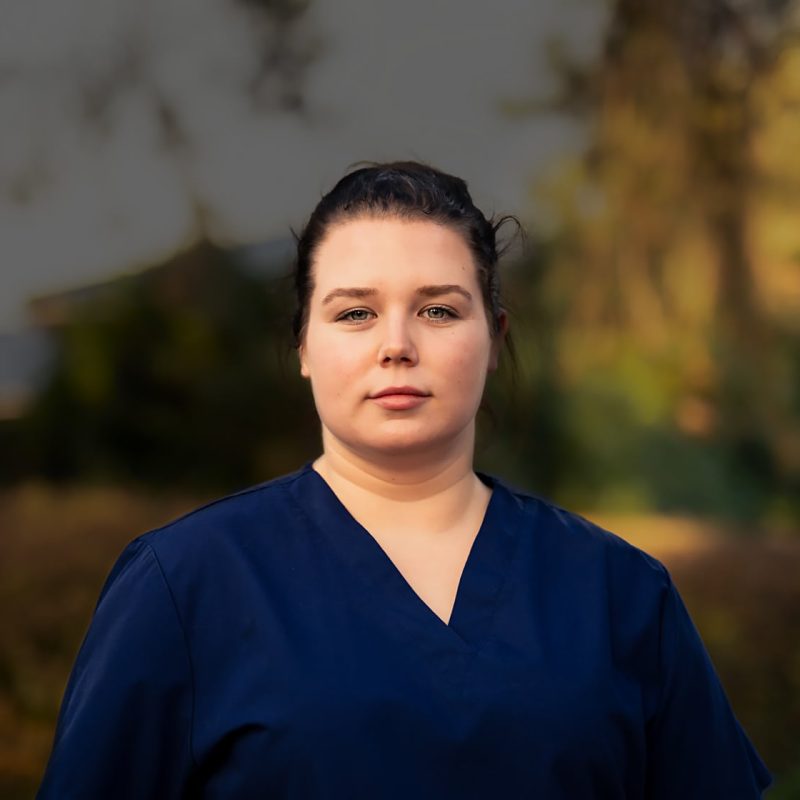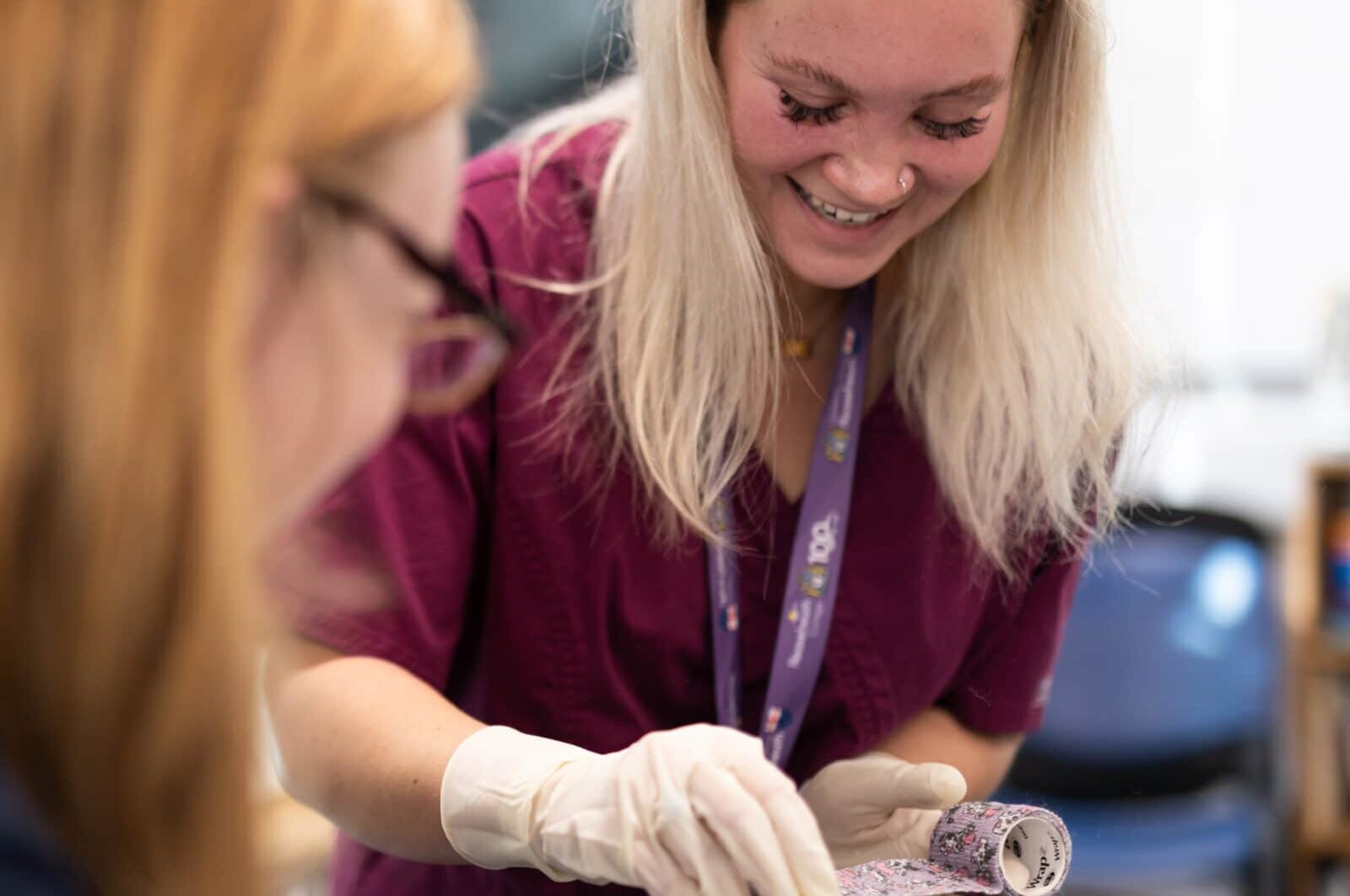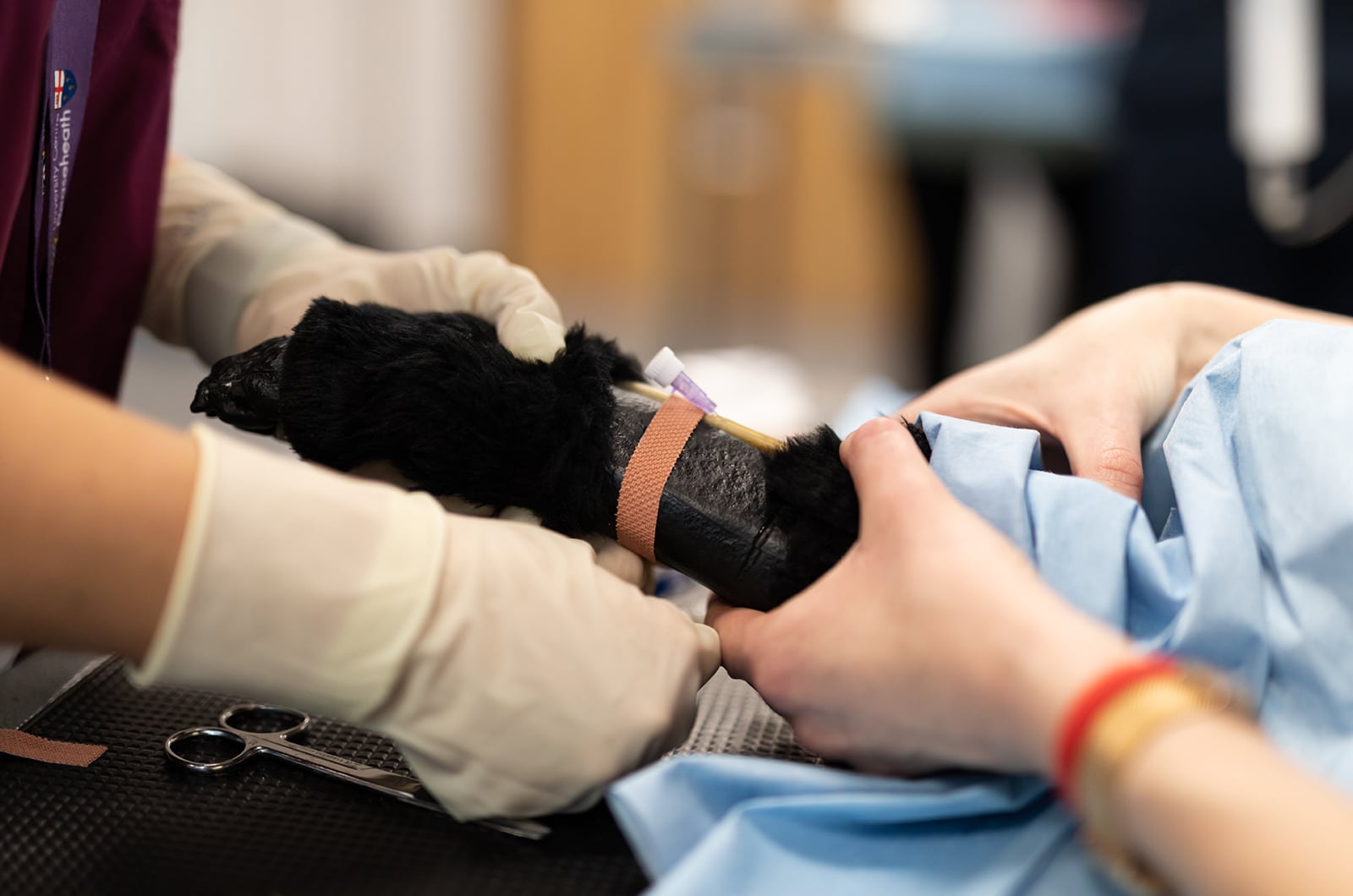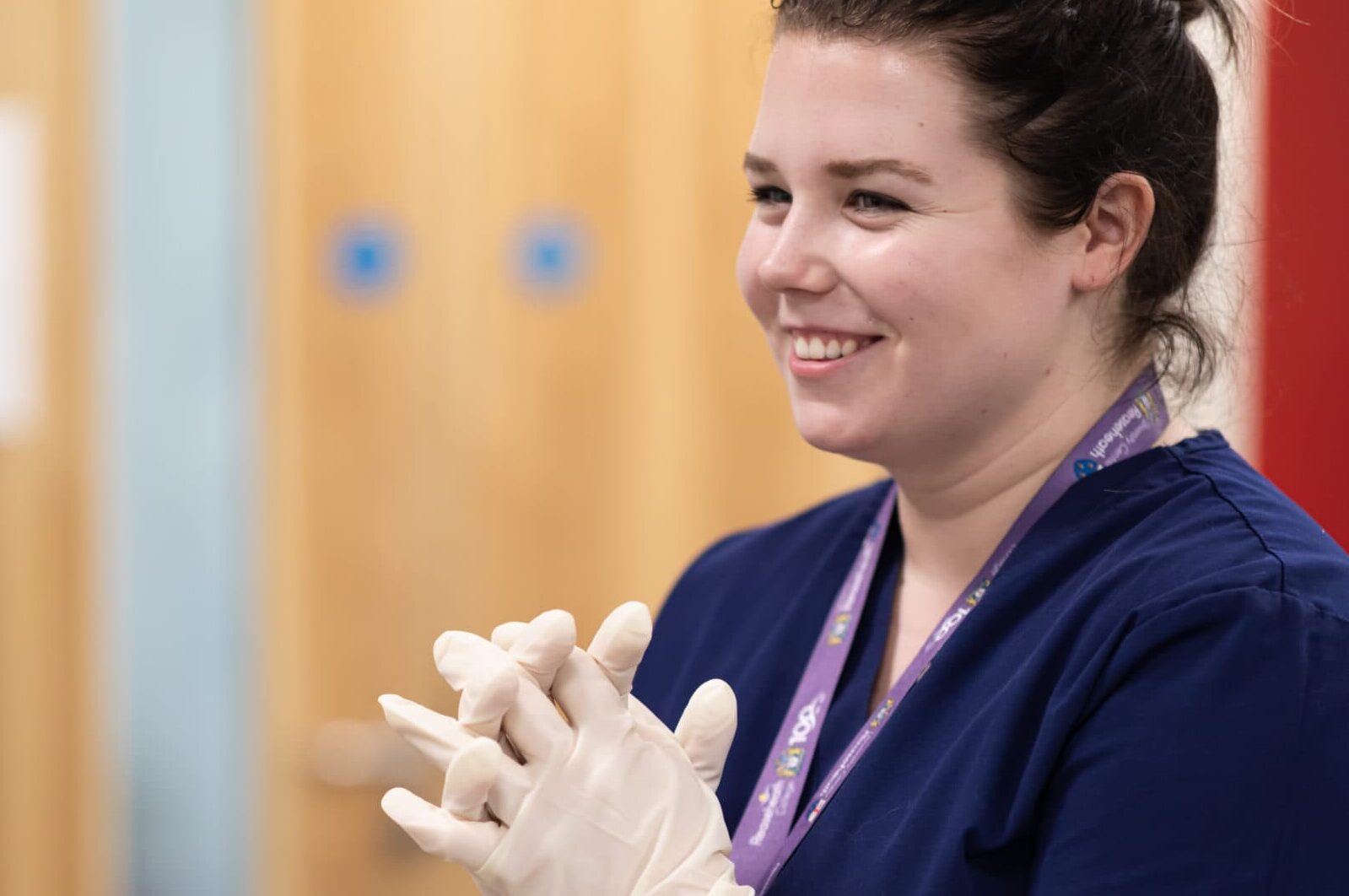As the range of responsibilities held by veterinary nurses increases, practices are looking for veterinary nurses qualified at degree level to fulfil this requirement.
If you have the motivation and commitment to build a career within the veterinary nursing profession, this degree is for you.


Accredited by the Royal College of Veterinary Surgeons (RCVS), this BSc (Hons) Veterinary Nursing degree course enables you to develop a range of professional skills, knowledge and competencies needed in the veterinary nursing profession.
You will enjoy a unique combination of academic study and practical learning, utilising our animal centre and dedicated clinical training facility to advance your skills and knowledge.
This will be reinforced through the completion of a clinical placement* in an approved veterinary training practice.
*Travel arrangements at your own cost.


A tour of the Veterinary Nursing facilities at University Centre Reaseheath.
Students on the BSc (Hons) Veterinary Nursing degree are expected to study and complete 120 credits per year, which comprises six modules of study per academic level. All modules in years one to three are compulsory and must be passed to ensure that students acquire the fundamental knowledge and skills required to fulfil the requirements of the professional body, the Royal College of Veterinary Surgeons (RCVS). Students will study three compulsory modules and have a choice of two from four options in Year 4 which will allow them to follow specialist interests.
* Programme Modification – Approved. In response to student and stakeholder feedback the course has been reviewed and changes made for September 2025 entry to the course structure and modules of study.
A minimum of 112 UCAS points from GCE ‘A’ Levels, T Levels or an alternative Level 3 qualification.
The department recommends the following potential entry qualifications:
Applicants must also have at least a C grade/ Grade 4 or above in 5 GCSEs including English, Maths and a Science subject or recognised equivalents.
Applicants must also fulfil the RCVS requirements for admission to a veterinary nursing programme. This includes the capacity to demonstrate the Day One Skills and Competences required of veterinary nurses in their day-to-day practice and demonstrate a fitness to practise. Further guidance on these issues can be found on the RCVS website at www.rcvs.org.uk. Applicants are also required to disclose any criminal convictions in line with RCVS requirements.
Applications from mature students or those with non-standard entry will be considered on an individual basis.
Applicants are required to complete a minimum of 70 hours work experience before starting the course. These must be within a veterinary practice, shadowing the work of registered veterinary nurses. A further 70 hours of work experience are encouraged. These could be within a veterinary practice or other animal-related enterprise. References from work experience providers will be sought as part of the application process.
Applicants may also be required to attend an interview to discuss their application, motivation and career aspirations to ensure their suitability for the professional elements of the degree programme.
The offer of a place on the programme will be made subject to fulfilment of the entry requirements, and satisfactory work experience references. Entry requirements in Clearing will not be reduced and will be as set out in the programme specification.
Applicants still undertaking work experience can apply, however it will be a condition of any offer made.
Year 1 (Level 4) – all modules are compulsory
Year 2 (Level 5) – all modules are compulsory
Year 3 (Level 5) – module is compulsory:
Year 4 (Level 6) – compulsory modules
Year 4 (Level 6) – optional modules
Students must also complete the OSCEs for Veterinary Nursing at the beginning of Year 4.
Availability of optional modules is subject to the recruitment of a minimum viable student number (7 individuals). Should a module not be deemed viable for operation, all the students who had selected it will be contacted in writing before the start of the academic year and asked to select an alternative from the options available.
Students will be expected to make option module choices for the following academic year during March/April using the online module selection service. Confirmation of module choices will be provided via email following approval.
Students on this degree will experience a variety of teaching and learning approaches across all levels of study. These will include:
Students will typically have between 10 and 15 contact hours per week, typically across 2 to 4 days. Additionally, students will be expected to undertake independent study to reinforce learning that has taken place in timetabled sessions.
Staff teaching on the programme include a number of registered veterinary nurses as well as veterinary surgeons. In addition, staff from the Higher Education Animal Sciences team will also contribute to the programme through the delivery of the shared modules.
Class sizes average between 20 and 30 for modules that are unique to this programme. For modules that are shared across several programmes, class sizes would be higher than this.
Assessment Methods
Assessment will take a variety of forms including reports, essays, academic posters, presentations, clinical role play and examinations. Assessment components will be identified in line with the University of Chester modular framework guidance.
An additional requirement of the assessment strategy will be the demonstration of clinical skills competence through observation during clinical placement.
This programme is accredited by the Royal College of Veterinary Surgeons as conveying a license to practise . This means that successful graduates are eligible to apply for entry to the register of veterinary nurses and use the post-nominal RVN.
Students are expected to complete and pass all the identified modules at the required level of study in order to progress to the following year. To successfully progress to the next level of study, students are required to achieve the minimum weighted module mark of 40% for each module. In addition, for specified modules at Levels 4 and 5, each item of assessment in the module must achieve the minimum threshold attainment of 40%.
If an item of assessment within a module is failed (i.e. it does not achieve the minimum mark of 40%), a reassessment opportunity may be offered. Whilst the format of a reassessment is likely to be the same as the original assessment, the specific details will be different. Failure to complete outstanding components of assessment may result in the student not being eligible for progression.
Students must complete and achieve the requirements of the clinical placement before they are eligible to take the OSCEs.
A variety of assessment forms are included in this programme. These include written reports, presentations, case studies, research proposals, workbooks, academic posters and written and practical exams.
Typically, students will complete 2 to 3 items of assessment for each module which will include a combination of the assessment types identified above. A number of modules in years 1 to 3 include written and practical exams in line with RCVS requirements.
In addition, students undertake a formative assessment at the start of the programme. This is designed to help identify any additional support needs the student may have but also to establish expectations in terms of the requirements of higher education level work. Formative assessment opportunities are built into all modules through the use of in-class activities such as question and answer, debates and seminar discussions and through the completion of activities using the virtual learning environment, Moodle.
Details of all assessments are made available to students at the start of the academic year, typically via their course handbook. This includes details of the modules, assessment components, learning outcomes assessed and launch, submission and return dates. Each coursework assessment is accompanied by a specific brief that provides details of the assessment task along with the assessment and grading criteria that will be used for marking purposes.
Feedback
Opportunities for feedback on your progress will be available throughout your course. This will be provided in many formats, including written and verbal. Students should expect to receive provisional assessment marks and constructive feedback within twenty working days of the original submission date. If this is not possible, students will be informed in a timely manner and provided with a revised return date. Assessment marks are confirmed at the Module Assessment Board.
All assignment work is to be submitted electronically via Turnitin. This enables work to be checked to identify instances of plagiarism or academic misconduct. Work is marked electronically using Grademark software and returned to students via the module submission page or link.
Students will be able to access course timetables for the academic year in September.
To meet Royal College of Veterinary Surgeons (RCVS) requirements for registration as a veterinary nurse, students will need to complete a minimum of 1,800 hours of clinical placement in an approved Training Practice as part of their course. As a result, the B.Sc. (Hons) in Veterinary Nursing is delivered over four years with periods of clinical placement spread out in blocks over the first three years.
Completion and achievement of the clinical placement requirement is compulsory for those wishing to graduate with the Veterinary Nursing degree.
University Centre Reaseheath maintains a list of approved training practices that are prepared to provide clinical placements for degree students. Students are given access to this list and are supported to identify and secure a suitable placement. Students may also suggest alternative placement providers but these must be judged suitable by University Centre Reaseheath before a placement can be undertaken in them.
Students are required to complete he equivalent of 48 weeks of placement based on a 37.5 hour week. When selecting a placement, students should consider the financial implications associated with accommodation and travel as University Centre Reaseheath is unable to subsidise such costs.
Tuition Fees
As a student at UCR, you will have two main costs to meet; your tuition fees and living costs.
Our full-time tuition fees for UK and EU students, entering University, can be found on our student finance page. These fees are charged for each academic year of a course and are set by the college annually.
Tuition fees for international students can also be found on our student finance page.
Additional Costs
This programme includes significant periods of compulsory clinical placement. Students should consider the costs associated with accommodation, travel, subsistence etc that are likely to arise from this when selecting their clinical placement provider.
Students may also wish to purchase their own personal copies of recommended set-texts to assist them in their studies and to support them whilst on clinical placement. A full list of recommended texts is available prior to enrolment. It is not essential to purchase key texts as the campus library is well stocked and has multiple copies of the main texts.
Equipment Costs
Prices of equipment are subject to change dependent on retailer.
VN01
Before applying, please visit our Apply Now page for further information
A minimum of 112 UCAS points
September 2026
Full-time: 4 years
Here you will find useful information about the services and support available at University Centre Reaseheath. Click to expand each item:
University Centre Reaseheath is committed to providing additional financial support to those who need it. To find out about the bursary schemes available visit our additional financial support page.
For students to get the best out of their time at University Centre Reaseheath, we must both recognise that we owe obligations to each other. These obligations are set out in our UCR Student Contract. Before you accept an offer of a place at University Centre Reaseheath, it is important that you read these contract conditions. If you are going to be living in Halls of Residence, you will also need to read the Student Accommodation Licence Conditions. Both of these contracts can be found here.
Click here to view the University Centre Reaseheath Student Protection Plan.
All UCR students are given the opportunity to apply for residential accommodation. First year students are guaranteed accommodation and this offer is made to all applicants who live more than a reasonable daily travelling distance from Reaseheath (providing you have applied before the UCAS equal considerations deadline. For full details on our halls of residence visit our accommodation page.
We have a team of dedicated professionals on hand to offer you support. These include our Student Services Team, Inclusive Learning Team, Library and Learning Resources Team and the Reaseheath Careers Service. You can find more information on the support provided at Reaseheath on our support page.
University Centre Reaseheath is proud to welcome international students. For more information, please visit our international students page.